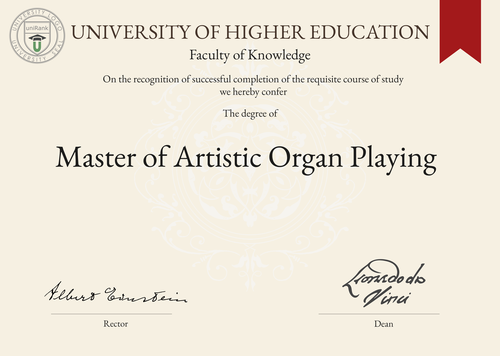
Master of Artistic Organ Playing (M.A.O.P.)
Guide to Master of Artistic Organ Playing Program/Course/Degree
Master of Artistic Organ Playing (M.A.O.P.)

Program Name:
Master of Artistic Organ PlayingProgram or Degree abbreviation:
M.A.O.P.Duration range:
Varies by country and university, typically 2-4 yearsTuition range:
Varies by country and university, typically $10,000-$30,000 per yearOverview:
The Master of Artistic Organ Playing program is designed for individuals who wish to further develop their skills and knowledge in organ playing. This program provides advanced training in organ performance, music theory, music history and related subjects. Students will have the opportunity to refine their technique, explore various musical styles and gain a deeper understanding of the organ as an instrument.Curriculum Overview by year:
- Year 1: Advanced Organ Technique, Music Theory, Music History, Performance Practice - Year 2: Organ Repertoire, Improvisation, Chamber Music, Pedagogy - Year 3: Electives, Research Project, Performance Opportunities - Year 4: Recitals, Thesis or Final ProjectKey Components:
- Intensive training in organ performance - In-depth study of music theory and history - Exploration of various musical styles and repertoire - Opportunities for improvisation and chamber music collaboration - Pedagogical training for those interested in teaching organCareer Prospects:
Graduates of the Master of Artistic Organ Playing program can pursue various career paths, including: - Professional organist in churches, concert halls and music institutions - Organ teacher at universities, conservatories, or private studios - Music director or conductor of choirs and ensembles - Composer or arranger specializing in organ music - Music researcher or scholarSalary Expectations:
Salaries for organists can vary greatly depending on factors such as experience, location and type of employment. On average, organists can earn between $30,000 and $70,000 per year. However, prestigious positions in renowned institutions or churches may offer higher salaries. For a more accurate understanding of salary expectations, you can utilize the Job Sites Search Engine, from our sister site jobRank, which searches over 4,600 job sites worldwide. Make sure to specify not only the job title but also the country you are interested in.Conclusions:
It is important to note that the duration, tuition fees, curriculum, key components, career prospects and salary expectations of the Master of Artistic Organ Playing program can vary significantly depending on the country or location where you choose to study, as well as the university you select. Prospective students are encouraged to research and compare different programs to find the best fit for their goals and aspirations. To explore where the Master of Artistic Organ Playing degree is offered worldwide, visitors can utilize the uniRank World Universities Search Engine. This powerful tool allows individuals to search for universities and institutions that offer this specific degree program, providing a comprehensive list of options across the globe.World Universities Search Engine
search for Master of Artistic Organ Playing (M.A.O.P.) and add the Location (country, state etc.) or specific University you are interested in studying at.
Query examples:
- Master of Artistic Organ Playing (M.A.O.P.) United States
- Master of Artistic Organ Playing (M.A.O.P.) United Kingdom online
- Master of Artistic Organ Playing (M.A.O.P.) Australia international students
- Master of Artistic Organ Playing (M.A.O.P.) University of California
- Master of Artistic Organ Playing (M.A.O.P.) University of London tuition fees
- Master of Artistic Organ Playing (M.A.O.P.) University of Sydney scholarships
Share Program/Course
Interesting? Share this program/course/degree info with your friends now.